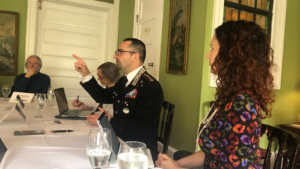In crisis scenarios, one does not need to be a cultural heritage expert to make a difference—cultural destruction is an interdisciplinary issue that demands cross-sector cooperation.
On March 25, the Penn Cultural Heritage Center honored an individual whose well-rounded career exemplifies a multifaceted approach to protecting heritage under threat. Cori Wegener, founder of the U.S. Committee of the Blue Shield and former director of the Smithsonian Cultural Rescue Initiative, has leveraged her unique career trajectory—spanning the Army Reserve and museum sector—to safeguard heritage at risk. Notably, she played a key role in the aftermath of the 2003 looting of the Iraq Museum in Baghdad.
Cori Wegener is among six courageous individuals featured in Nancy Moses’ newly released book, The Rescuers: The Remarkable People Who Saved World Heritage. In it, Moses highlights the careers of exemplary heritage practitioners dedicated to rescuing tangible, intangible, and natural cultural heritage on the brink of destruction.
Drawing from these case studies, Moses concludes that protecting cultural heritage ultimately depends on swift and decisive action. Addressing global threats to cultural heritage requires collaboration among archaeologists, law enforcement, policymakers, military personnel, and museum professionals.
Events such as this provide valuable opportunities to exchange ideas and strengthen networks. Director of Programs Helena Arose was honored to participate in this discussion. As the Antiquities Coalition continues to lead efforts in policy research, public outreach, and strategic partnerships, we remain eager to connect with scholars and practitioners who share our commitment to safeguarding cultural heritage.
Stay tuned for more updates on our initiatives and collaborations.
Find a copy of The Rescuers: The Remarkable People Who Saved World Heritage, here.
Learn more about the Penn Cultural Heritage Center, here.








